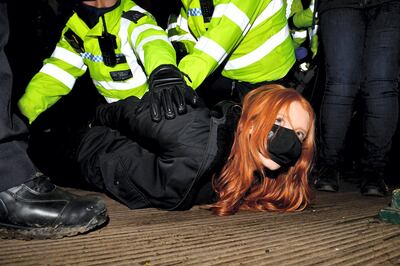Cressida Dick is stepping down, five years after becoming the first woman to lead London’s Metropolitan Police.
Almost 40 years after her career began, Ms Dick, 61, is preparing for a future without policing, after London mayor Sadiq Khan made clear he had no confidence in her leadership as Metropolitan Police commissioner.
Ms Dick said his position had left her with “no choice” but to stand down.
“It is with huge sadness that following contact with the mayor of London today, it is clear that the mayor no longer has sufficient confidence in my leadership to continue. He has left me no choice but to step aside as commissioner of the Metropolitan Police Service,” Ms Dick said in her resignation statement.
Home Secretary Priti Patel is responsible for finding a replacement for the police chief, who has agreed to remain in her post until a successor is appointed.
Since taking over the Met in 2017, Ms Dick has been hit by a string of controversies and scandals that are bound to play a role in her legacy.
Who is the Metropolitan Police Commissioner?
Ms Dick joined the Met in 1983 as a constable and was responsible for patrolling a beat in the West End of London. Within a decade she had been promoted to chief inspector, before transferring to Thames Valley Police, a neighbouring force, in 1995. There she worked as a superintendent and chief superintendent.
She returned to the Met in 2001 as a commander and was handed a series of promotions over the following years.
In 2017, she was appointed commissioner of the force. In this role, she is responsible for overseeing the policing of London, plus nationwide counter-terrorism policing.
In 2019, she was made Dame Commander of the Order of the British Empire (DBE) in the resignation honours of Theresa May, prime minister at the time.
However, a number of scandals have marred Ms Dick's career.
The Charing Cross report
A report by the Independent Office for Police Conduct revealed highly offensive language used on social media by officers from a now disbanded team based in Westminster, central London.
Last Tuesday, the watchdog took the unusual step of publishing the messages in full — despite many of them being too offensive to print as part of mainstream news coverage — because it said it was important for the public to know.
Officers made jokes about rape, domestic violence, racism and used homophobic language and derogatory terms for disabled people.
In response, Mr Khan Ms Dick “on notice”, before eventually forcing her to resign by saying he had lost confidence in her leadership.
Murder of Sarah Everard by Met officer Wayne Couzens
Ms Dick had faced calls to resign after it emerged that serving Met officer Wayne Couzens had abducted, raped and murdered Sarah Everard in March 2021.
The firearms officer had used his warrant card and handcuffs to abduct his victim, 33, from a south London street, using Covid lockdown rules to stage a false arrest.
Ms Dick said she felt sickened and that Couzens had brought shame on the Met.

Policing of Sarah Everard vigil
The police chief also came under fire over the Met’s handling of a vigil in memory of Everard.
Photos showing female demonstrators being held on the ground and handcuffed prompted outrage, but the force was later cleared by a police watchdog.
The report by Her Majesty’s Inspectorate of Constabulary and Fire and Rescue Services concluded the police “acted appropriately” when dealing with the event, but also found it was a “public relations disaster” and described some statements made by members of the force as “tone deaf”.
Photos of murdered sisters Bibaa Henry and Nicole Smallman
The Met was forced to apologise to the family of murder victims Bibaa Henry and Nicole Smallman after two Met officers took photos of their bodies at the crime scene.
Deniz Jaffer and Jamie Lewis were each jailed for two years and nine months each in December for taking pictures of the sisters and sharing them with friends and colleagues on WhatsApp. The officers described the victims as “dead birds” in their posts.
Jaffer and Lewis had been assigned to guard the scene after the sisters were found dead in bushes in a park in Wembley, north-west London, in June 2020.
The Met issued an apology to the victims’ relatives for the “shameful” and “utterly unprofessional” actions.
Jean Charles de Menezes shooting
Ms Dick was head of the operation that led to the shooting of Jean Charles de Menezes in Stockwell, south London, in July 2005.
The Brazilian national was shot by an officer who mistook him for a terrorist, after four suicide bombers had launched attacks in central London on 7 July 2005.
Ms Dick came under scrutiny but was later absolved of any blame by a jury.
Appearing on BBC Radio 4's Desert Island Discs programme, in 2019, Ms Dick described it as an “awful time”, adding: “I think about it quite often.
“I wish, wish, wish it hadn’t happened, of course, but if anything, it has made me a better leader, a better police officer and it has made me more resilient,” she said.
The killing of Daniel Morgan
Private investigator Daniel Morgan was killed with an axe in a pub car park in Sydenham, south-east London, in March 1987. A string of unsuccessful investigations into his death have been mired in claims of police corruption.
In June 2021, an independent report accused the Met of institutional corruption over its handling of the case, saying it had concealed or denied failings to protect its reputation.
Ms Dick apologised to Morgan’s family, saying it was a “matter of great regret that no one has been brought to justice and that our mistakes have compounded the pain suffered by Daniel’s family”.

